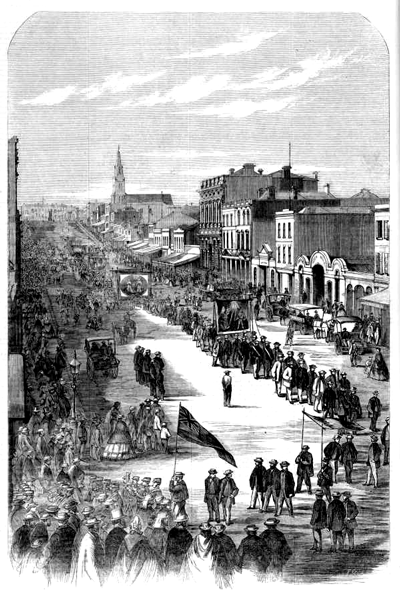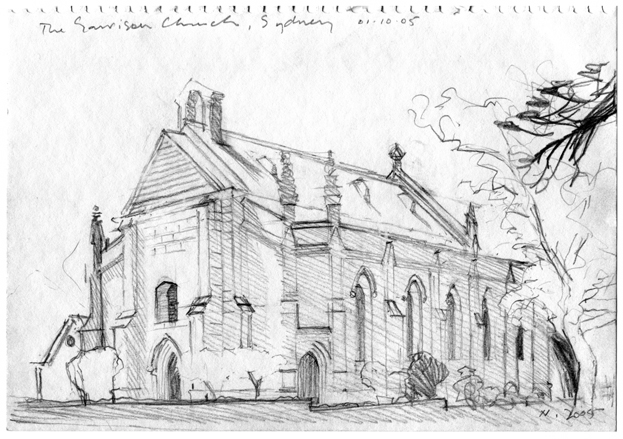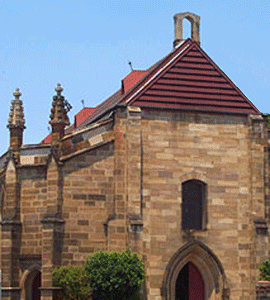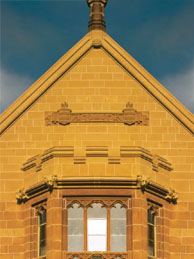Eight Hour Day in Australia

Eight Hours Demonstration' in Australian News for Home Readers 19 May
1866
Source: State Library of Victoria.

The Garrison Church: sketch by Peter
Neilson on the 150th anniversary
of the eight hour day in Sydney
 Sydney
Sydney
Historian Rowan Cahill writes:
"On 18 August 1855 the Stonemasons‚ Society in Sydney issued
an ultimatum to employers that in six months time, masons would only work
an eight-hour
day. However men working on the Holy Trinity Church (Garrson Church) in
Argyle Cut, and on the Mariners Church, (an evangelical mission to seafarers,
now
an art gallery and café) in Lower George Street (98-100 George Street),
could not contain their enthusiasm and decided not to wait. They pre-emptively
went on strike, won the eight-hour day, and celebrated with a victory dinner
on 1 October 1855." (read
more)
 Melbourne
Melbourne
On the 21st April 1856 there was a march from a building site,
at the Old Quadrangle Building which was the original building at Melbourne
University. The building still stands today. Workers marched from there
to the city in celebration of the institution of the eight hour day
on that worksite.
The intertwined numbers '888' soon adorned the pediment of many union buildings around Australia. Coming only 16 months after the Eureka Rebellion and 4 months after the Victorian Constitution became effective, the Eight Hour Day also became a symbol of the rights of workers to organise to achieve their rights not only as workers, but as citizens in a democratic society.
The Eight Hour March which began on April 21 1856 continued each year until 1951.
Australian workers continue to enjoy the Labour Day public holiday.
Eight Hour Day in USA
The National Labour Union at Baltimore in August 1866 passed a resolutuion that said, "The first and great necessity of the present to free labour of this country from capitalist slavery, is the passing of a law by which eight hours shall be the normal working day in all States of the American Union. We are resolved to put forth all our strength until this glorious result is achieved."
At its convention in Chicago in 1884, the AFL (American Federation of Labour) resolved that "eight hours shall constitute a legal day's labour from and after 1 May, 1886, and that we recommend to labour organisations throughout this jurisdiction that they so direct their laws as to conform to this resolution by the time named."
May Day Internationally
The International Socialistic Congress of Working Men (later known as the Second International) opened in Paris on 14 July 1889, on the hundredth aniversary of the fall of the Bastille. The congress passed the following resolution: "There shall be organised a great international demonstration at a fixed day, so that on the same agreed day, in every country and in every town, the workers shall call upon the State for legal reduction of the working day to eight hours... In view of the fact that a similar demonstration has been decided upon by the American Federation of Labor for the 1st May, 1890 ..... this date is adopted for the international demonstration."
May Day in Australia
The first large Australian May Day demonstration took place in Barcaldine in Queensland during the 1891 Shearers Strike. For the occasion Henry Lawson wrote his poem "Freedom on the Wallaby". The following May Day he wrote "The Old Rebel Flag in the Rear".
Australian Songs
Shores of Botany Bay
A song by Anon (late 19th century?)
Oh I'm on my way down to the quay
Where a big ship now does lie
For to take a gang of navvies
I was told to engage
But I thought I would call in for a while
Before I went away
For to take a trip in an emigrant ship
To the shores of Botany Bay
Chorus
Fairwell to your bricks and mortar
Fairwell to your dirty lime
Fairwell to your gangway and gang planks
And to hell with your overtime
For the good ship Ragamuffin
Is lying at the quay
For to take old Pat with a shovel on his back
To the shores of Botany Bay
The best years of our life we spend
At working on the docks
Building mighty wharves and quays
Of earth and ballast rocks
Our pensions keep our lives secure
But I'll not rue the day
When I take a trip on an emigrant ship
To the shores of Botany Bay
For the boss came up this morning
And he said "Well Pat hello
If you do not mix that mortar fast
Be sure you'll have to go"
Of course he did insult me
I demanded of my pay
And I told him straight I was going to emigrate
To the shores of Botany Bay
And when I reach Australia
I'll go and look for gold
Sure there's plenty there for the digging
Or so I have been told
Or I might go back into my trade
Eight hundred bricks I'll lay
In an eight hour day for eight bob pay
On the shores of Botany Bay
Galloway and Stephens
A song by Clem Parkinson©1985
Who were the men who led the fight
that won the eight hour day?
The men to whom we owe a debt we never can repay
Their names will live forever though they lie beneath fhe clay
Twas no one else but Galloway and Stephens
Chorus
It was Galloway and Stephens who pioneered the trail
Who led the band of working men determined to prevail
And so we stand together as their names we proudly hail
And shout "hurrah" for Galloway and Stephens
Back in the dark
satanic days - a time when life was bleak
The workers toiled from dawn to dusk for 60 hours a week
Until they said "We'll make a stand - no time for being meek
We'll put our trust in Galloway and Stephens"
They were the honest
working men the history books ignore
To tell instead of emperors and jingoistic war
And crooked politicians, worthless monarchs by the score
We'd trade them all for Galloway and Stephens
The Eight-Hour Day
A song by John Warner ©1998
Tune: Bluey Brink
Come all you workers and hear what I say,
They're trying to plunder the eight-hour day,
Won by our forbears in a bloody campaign,
So rise up and be in the struggle again.
Chorus:
So stand up united, let no one betray
Our right and our children's - the eight-hour day.
Individual contracts
were made for the fool,
If business divides us then business can rule,
If we let the government back what they say,
It's a twelve-hour shift and no penalty pay.
This system they're making's
a ticket to hell,
Working weekends and Christmas and New Year as well,
No time for the needs of our children and wives,
If we let productivity measure our lives.
It's a user-pay's system as
I have heard tell,
They're using us hard, so they'd better pay well,
Business and government walk hand in fist
And it's only in union we can resist.
So come all you workers and fight
this abuse,
Let overtime hours be our right to choose,
Fight to regain a fair penalty pay,
And grip like a bulldog the eight-hour day.
Notes
Shores of Botany Bay was collected from Duke Tritton by John Meredith. It describes the way that Australian working conditions were taken note of by workers elsewhere. Clem Parkinson wrote Galloway and Stephens to commemorate the leaders of the 1896 stonemasons' Eight Hour march from Melbourne University into the city. John Warner wrote The Eight-Hour Day to warn against the new contacts, flexibilty of working hours and erosion of penalty rates so favoured bythe late 20th century "economic rationalists"